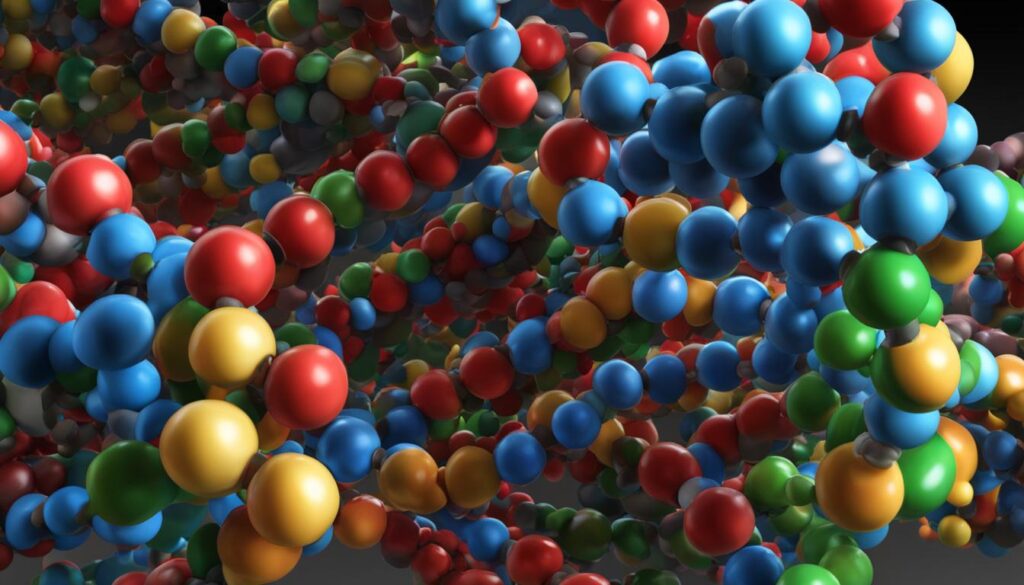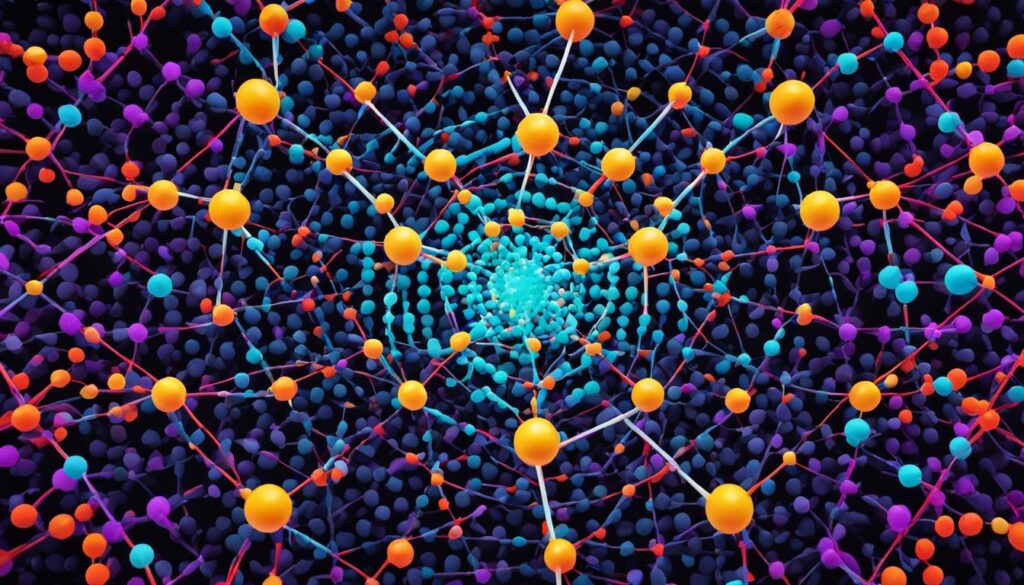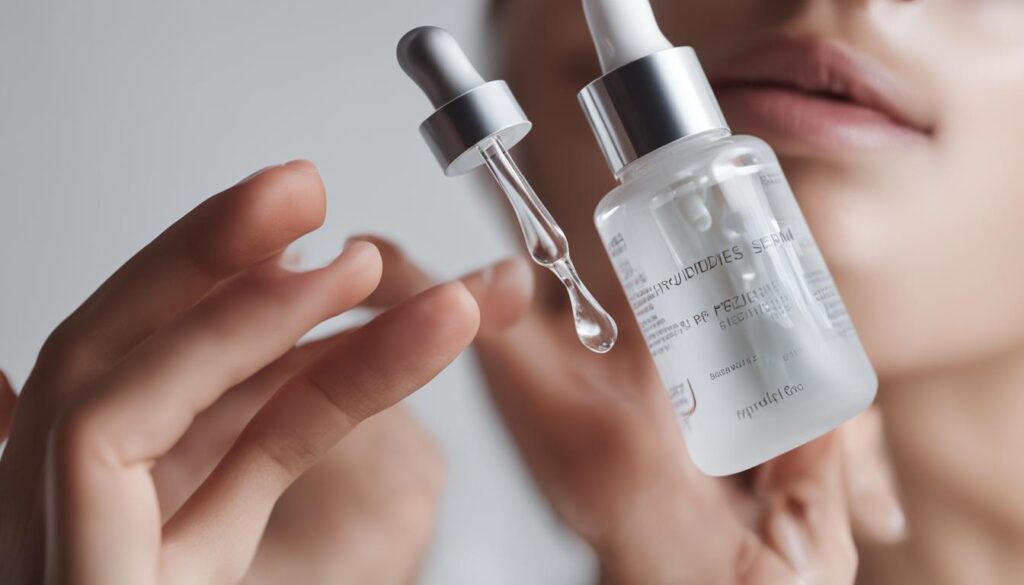Peptides are smaller versions of proteins that offer a multitude of health benefits. Their unique properties make them valuable in various applications, from skincare to sports performance. In this article, I will delve into the diverse uses and benefits of peptides, shedding light on their potential to enhance our well-being.
Key Takeaways:
- Peptides are smaller versions of proteins and possess numerous health benefits.
- They have pro-aging support, anti-inflammatory properties, and can aid in muscle-building.
- Popular peptide supplements include collagen peptides for anti-aging and skin health, and creatine peptides for muscle growth and athletic performance.
- Peptides can be derived from natural food sources or made synthetically.
- They offer potential benefits in skincare, bodybuilding, weight loss, hair growth, immune function, and more.
What are Peptides?

Peptides are short strings of amino acids, typically comprising 2-50 amino acids. They are similar to proteins but contain fewer amino acids. Peptides can be easier for the body to absorb than proteins due to their smaller size. They can penetrate the skin and intestines more easily, entering the bloodstream quickly. Peptides can be derived from plant or animal sources such as eggs, milk, meat, fish, beans, and lentils. Scientists are particularly interested in bioactive peptides that have beneficial effects on the body.
Bioactive peptides have been found to have specific functions and activities that can be beneficial for human health. These peptides can target various physiological processes and act as signaling molecules in the body. They have gained attention in recent years for their potential therapeutic applications and health-promoting properties.
Types of Peptide Supplements

Peptide supplements offer a diverse range of options for individuals looking to enhance their health and well-being. Let’s explore some of the most common types of peptide supplements available:
1. Collagen Peptides
Collagen peptides have gained significant popularity due to their numerous benefits for skin health and anti-aging. These peptides are derived from collagen, a protein that helps maintain the structure and elasticity of our skin. By incorporating collagen peptides into your daily routine, you can promote smoother, firmer, and more youthful-looking skin. They can also aid in wound healing and improve overall skin hydration.
2. Creatine Peptides
Creatine peptides are widely used by fitness enthusiasts and athletes seeking to enhance their strength and muscle mass. By combining creatine with peptides, these supplements provide a more easily digestible and absorbable form of creatine compared to traditional creatine monohydrate. Creatine peptides can help maximize energy production during high-intensity workouts, leading to improved athletic performance and muscle growth.
3. Peptide Hormones
Peptide hormones play crucial roles in various physiological processes within the body. However, it is important to note that certain peptide hormones, like follistatin, have raised concerns in the sports industry due to their potential performance-enhancing effects. Athletes should be cautious as these peptide hormones may be banned by anti-doping agencies.
Peptide supplements can be derived from various sources, including plant and animal proteins. Each type of peptide supplement offers unique properties and benefits, catering to different health goals and requirements.
| Peptide Supplement | Benefits |
|---|---|
| Collagen Peptides | Promotes skin health, reduces signs of aging, improves wound healing |
| Creatine Peptides | Enhances strength, aids muscle growth, improves athletic performance |
| Peptide Hormones | May enhance athletic performance, but caution should be exercised due to potential anti-doping regulations |
When considering peptide supplements, it is important to consult with a healthcare professional or a registered dietitian to determine the most suitable options based on your specific needs and goals. These experts can provide personalized guidance to ensure safe and effective usage of peptide supplements.
Benefits of Peptides

Research indicates that bioactive peptides offer a wide range of health benefits. These powerful compounds have been found to:
- Lower high blood pressure
- Kill harmful microbes
- Reduce inflammation
- Prevent blood clot formation
- Improve immune function
- Act as antioxidants
Peptide supplements are commonly used for their anti-aging properties. They can slow down the aging process, improve skin health, and promote wound healing. Additionally, peptides play a role in preventing age-related bone loss and supporting muscle growth and strength.
To better understand the benefits of peptides, let’s take a closer look at some of their remarkable effects:
Lowering Blood Pressure
Studies have shown that certain peptides can help regulate blood pressure levels. These peptides inhibit enzymes that cause blood vessels to narrow, resulting in relaxed blood vessels and lower blood pressure. This effect can be beneficial for individuals with hypertension or at risk of developing cardiovascular diseases.
Killing Microbes
Peptides possess antimicrobial properties, enabling them to destroy bacteria, viruses, and fungi. They can disrupt the cell membranes of these pathogens, effectively neutralizing their harmful effects. This antimicrobial action makes peptides potential candidates for developing new antibiotics and antiviral medications.
Reducing Inflammation
Some peptides exhibit anti-inflammatory properties, helping to alleviate inflammation in the body. By modulating the immune response, peptides can reduce the production of pro-inflammatory molecules, providing relief for conditions such as arthritis and inflammatory bowel disease.
Preventing Blood Clot Formation
Specific peptides have anticoagulant properties, meaning they can prevent the formation of blood clots. These peptides inhibit clotting factors and platelet aggregation, reducing the risk of thrombosis. This anticoagulant ability may be valuable for individuals with cardiovascular diseases or those at risk of developing blood clots.
Improving Immune Function
Peptides can have a positive impact on the immune system, enhancing its ability to defend against infections and diseases. Certain peptides can stimulate immune cells, leading to increased production of antimicrobial peptides and enhanced immune responses. This immune-boosting effect may contribute to overall health and well-being.
Acting as Antioxidants
Peptides can function as antioxidants, counteracting oxidative stress and protecting cells from damage caused by free radicals. These peptides scavenge and neutralize free radicals, preventing them from causing cellular harm. This antioxidant activity may have implications for various health conditions, including aging, neurodegenerative diseases, and certain cancers.
Therefore, the diverse health benefits offered by peptides make them an intriguing area of scientific research. From their ability to regulate blood pressure and kill harmful microbes to their anti-inflammatory properties and antioxidant effects, peptides have the potential to support overall health and well-being.
Image: Peptides Benefits
Uses of Peptides in Skincare

When it comes to skincare, peptides have become a popular ingredient due to their anti-aging effects and overall skin benefits. Skincare products that incorporate peptides, such as creams and lotions, can have a significant impact on skin elasticity, hydration, and the reduction of wrinkles.
Collagen peptides, in particular, are widely used in skincare products for their ability to rejuvenate and improve skin health. Collagen is a structural protein that provides support and strength to the skin, but its production naturally decreases with age. By incorporating collagen peptides into topical formulations, it is possible to replenish and stimulate collagen production, leading to improved skin elasticity and reduced appearance of wrinkles.
Furthermore, peptides may also play a role in protecting the skin from sun damage. Certain peptides can stimulate melanin production, the pigment responsible for protecting the skin from harmful UV radiation. By stimulating melanin production, peptides can provide an additional layer of defense against the sun’s harmful rays, reducing the risk of sunburn and premature aging.
“Peptides in skincare products can help combat signs of aging and improve overall skin health.”
Many anti-aging cosmetics also incorporate peptides as key ingredients. These products claim to reduce the appearance of wrinkles, firm the skin, and improve blood flow, resulting in a more youthful complexion. While individual results may vary, skincare products containing peptides have gained popularity for their potential to improve skin texture, tone, and overall appearance.
In summary, peptides offer a wide range of benefits when it comes to skincare. From improving skin elasticity and hydration to reducing the appearance of wrinkles, peptides have become an essential component of many anti-aging skincare products. By stimulating collagen production, protecting against sun damage, and enhancing overall skin health, peptides can be valuable assets in any skincare routine.
Uses of Peptides in Bodybuilding

When it comes to bodybuilding and muscle growth, peptides have become an essential tool for fitness enthusiasts. These small amino acid chains play a significant role in enhancing strength and promoting muscle mass. Peptides in bodybuilding have gained popularity due to their various benefits and improved digestion compared to other forms of protein intake.
In particular, creatine peptides have become widely used in the fitness community. Their unique composition allows for easier digestion, resulting in fewer digestive issues compared to traditional creatine proteins. This makes creatine peptides an attractive option for individuals looking to improve their strength and enhance muscle growth.
Collagen peptides, along with resistance training, have also been found to be effective in increasing muscle mass and strength, especially in older adults. By incorporating collagen peptides into their routine, bodybuilders and athletes can optimize their muscle-building potential.
Peptide supplements serve as valuable tools for those seeking to support muscle growth and improve athletic performance. Whether it’s through creatine peptides or collagen peptides, these supplements provide targeted support for bodybuilders and fitness enthusiasts.
Other Uses of Peptides

Peptides have expanded beyond skincare and bodybuilding to offer a multitude of other applications. Studies have indicated their potential in aiding weight loss by enhancing metabolism and promoting fat burning. Additionally, peptides have shown promise in stimulating hair growth by facilitating cell repair and production. Moreover, peptides may possess immune-boosting properties that contribute to illness prevention and expedited recovery. Although further exploration is necessary to unveil the full extent of their benefits, peptides have the potential to revolutionize various fields of application.
By boosting metabolism and facilitating fat burning, peptides could play a significant role in weight loss efforts. Research suggests that certain peptides can help the body increase calorie expenditure and break down stored fat. Incorporating peptide supplements into a balanced diet and regular exercise routine may offer support for individuals striving to achieve their weight loss goals.
Peptides for Hair Growth
Hair loss or thinning can be distressing, and peptides may hold the key to combating these issues. Peptides have been found to promote hair growth by improving cell repair and stimulating the production of hair follicles. By incorporating peptides into hair care products or using peptide-based treatments, individuals may experience enhanced hair growth and improved scalp health.
“Peptides have shown promise in promoting weight loss and hair growth, illustrating their potential in these diverse applications.”
Furthermore, peptides may offer immune-boosting benefits that help the body defend against illnesses and facilitate faster recovery. Although additional research is needed to fully understand the mechanisms involved, peptides can be a promising avenue for enhancing overall health and well-being.
| Benefits of Peptides in Various Applications | Applications |
|---|---|
| Boost metabolism | Weight loss |
| Promote fat burning | Weight loss |
| Stimulate hair growth | Hair care |
| Improve cell repair | Hair care |
| Enhance immune function | General health |
| Prevent illness | General health |
| Promote faster recovery | General health |
As research continues to delve into the extensive possibilities, peptides hold the promise of further breakthroughs in weight loss, hair growth, immune function, and other areas. Harnessing the power of peptides may pave the way for innovative treatments and solutions.
Safety and Cautions
When it comes to using peptide supplements, it’s essential to prioritize safety and exercise caution. While peptide supplements are generally safe for healthy individuals, there are a few things to keep in mind.
Peptides Usage Tips
Here are some helpful tips for using peptides:
- Consult a healthcare professional: Before starting any peptide supplementation, it’s advisable to consult with a doctor or healthcare provider. They can provide personalized advice based on your specific needs and medical history.
- Buy from reputable companies: To ensure the quality and safety of peptide supplements, it’s essential to purchase them from reputable companies. Look for manufacturers that adhere to strict quality control standards and have a good reputation in the industry.
- Follow recommended dosages: Peptide supplements should be taken according to the recommended dosage instructions provided by the manufacturer. Avoid exceeding the suggested amounts, as this can increase the risk of potential side effects.
- Be aware of potential interactions: If you’re taking any medications or have underlying health conditions, be aware of potential interactions between peptide supplements and other drugs. It’s crucial to inform your doctor about any supplements you’re taking to avoid any adverse effects.
Peptides Side Effects
Although peptide supplements are generally well-tolerated, they may cause side effects in some individuals. Some common side effects reported include:
- Gastrointestinal issues: Peptide supplements taken orally may cause digestive discomfort, such as bloating, gas, or diarrhea.
- Skin sensitivity: Topical peptide products applied to the skin may cause skin irritation or sensitivity, especially in those with sensitive skin.
- Allergic reactions: Individuals with allergies or sensitivities to specific peptides may experience allergic reactions, such as itching, hives, or swelling.
If you experience any adverse reactions or side effects while using peptide supplements, it’s recommended to discontinue use and consult with a healthcare professional.
Remember, while peptide supplements have the potential to offer various benefits, it’s important to prioritize safety, follow usage guidelines, and seek professional advice when necessary.
Peptide Quality Selection
When it comes to selecting peptide supplements, quality and safety should be your top priorities. Choosing reputable brands ensures that you are purchasing products that have undergone rigorous testing and adhere to strict manufacturing standards. To make an informed decision, research the company’s website and look for detailed information about the active ingredients used in their supplements.
Be skeptical of any claims that sound too good to be true. While peptides do offer numerous potential benefits, it’s important to approach exaggerated claims with caution. Remember that results can vary from person to person, and no supplement can guarantee miraculous outcomes.
Always follow the recommended serving size provided on the packaging or recommended by your healthcare professional. Taking more than the recommended dose does not necessarily lead to better results and may increase the risk of side effects.
It is crucial to inform your doctor about any supplements you are taking, including peptide supplements. They can offer valuable insight and ensure that there are no potential interactions with your current medications or health conditions.
If you experience any adverse reactions while taking peptide supplements, such as allergic reactions, digestive discomfort, or unusual symptoms, seek immediate medical attention. Your healthcare provider can help determine if the symptoms are related to the supplement or require further investigation.
Remember, selecting high-quality peptides is essential for your health and well-being. Researching the brand, being cautious of exaggerated claims, and consulting with your doctor will help ensure you are making informed choices and prioritizing your safety.
Proper Storage of Peptides
To maintain the quality and efficacy of peptide supplements, proper storage is essential. Follow these peptide storage tips to ensure the longevity and effectiveness of your supplements:
- Store in a cool, dry place: Peptides should be stored in a location that is not exposed to excessive heat or moisture. A cool, dry environment helps to prevent degradation and maintain the stability of the peptides.
- Away from direct sunlight: Exposure to direct sunlight can cause peptides to degrade rapidly. Store them in a place where they are shielded from sunlight to preserve their potency.
- Avoid extreme temperatures: Peptides are sensitive to extreme temperatures. Avoid storing them in areas that are too hot or too cold, as this can lead to denaturation and loss of effectiveness.
It is also important to follow any specific storage instructions provided by the manufacturer. Some peptides may have additional requirements or recommendations for optimal storage conditions. Always refer to the product packaging or accompanying materials for guidance.
By following these peptide storage tips, you can ensure that your supplements remain potent and effective for longer periods, maximizing their benefits.
Natural Peptide Usage

Peptides are naturally present in protein-rich foods, such as meat, eggs, milk, beans, and lentils. These everyday foods contain a variety of peptides that offer numerous health benefits. Incorporating these natural peptide sources into your diet can provide you with an additional dietary source of these beneficial compounds.
While it is not necessary to rely solely on peptide supplements, some individuals may choose to incorporate specific peptide supplements, such as collagen peptides, into their routines to target specific health concerns. These supplements can provide a more concentrated and targeted source of peptides to support specific wellness goals.
In addition to dietary intake, peptides can also be used topically in skincare products. Peptide-rich creams and lotions can help improve skin elasticity, hydration, and reduce the appearance of wrinkles. By including peptides in your skincare routine, you can benefit from their anti-aging properties and promote overall skin health.
By incorporating natural peptide sources into your diet and skincare routine, you can take advantage of the potential health benefits these compounds offer. It’s important to note that individual results may vary, and it’s always recommended to consult with a healthcare professional before making any significant changes to your diet or skincare regimen.
Conclusion and Future Research
Peptide therapy and supplementation offer a wide range of potential benefits for health and wellness. Studies have shown promising results in terms of anti-aging effects, muscle growth, skin health, and immune function. However, it is important to note that there is still limited evidence to fully support the efficacy and safety of peptides.
More research is necessary to explore the full potential and effects of different types of peptides. Future studies should focus on larger sample sizes, longer durations, and randomized controlled trials to establish reliable conclusions. By conducting rigorous research, we can gain a deeper understanding of the specific mechanisms of peptides and their potential applications in various areas of healthcare.
Individuals considering peptide therapy or supplementation should exercise caution and consult with a medical professional before starting any new regimen. It is essential to understand the potential benefits and risks associated with peptide usage, as well as any potential interactions with existing medications or health conditions. Only a healthcare practitioner can provide personalized advice based on an individual’s unique circumstances.
As scientific research progresses, more discoveries about the uses and benefits of peptides may emerge. Innovative peptide formulations and delivery methods may also be developed, enhancing their effectiveness and accessibility. The future of peptide research holds great promise for advancing our knowledge and improving health outcomes.
FAQ
What are peptides?
Peptides are smaller versions of proteins, composed of 2-50 amino acids. They are similar to proteins but contain fewer amino acids, making them easier for the body to absorb.
What are some common types of peptide supplements?
Some common types of peptide supplements include collagen peptides for skin health and anti-aging, and creatine peptides for muscle growth and athletic performance enhancement.
What are the benefits of peptides?
Peptides have diverse benefits, including lowering blood pressure, reducing inflammation, improving immune function, and promoting muscle growth and strength.
How are peptides used in skincare?
Peptides are used in skincare products for their anti-aging effects. They can improve skin elasticity, hydration, reduce wrinkles, and stimulate melanin production for sun protection.
How do peptides benefit bodybuilding?
Peptides, such as creatine peptides, are popular in bodybuilding for enhancing muscle growth and increasing strength. Collagen peptides can also support muscle mass in older adults.
What are the other uses of peptides?
Peptides may aid in weight loss by boosting metabolism and fat burning. They can also stimulate hair growth and have immune-boosting properties.
Are peptide supplements safe?
Peptide supplements are generally safe for healthy individuals, but caution should be exercised, and it is advisable to consult a doctor before taking any supplements.
How can I select high-quality peptide supplements?
When selecting peptide supplements, it is important to choose reputable brands that prioritize quality and safety. Research the company’s website and consult a doctor for recommendations.
How should I store peptide supplements?
Peptide supplements should be stored in a cool, dry place away from direct sunlight and extreme temperatures, following the storage instructions provided by the manufacturer.
Can I obtain peptides from natural sources?
Yes, peptides are naturally present in protein-rich foods such as meat, eggs, milk, beans, and lentils, making it unnecessary to rely solely on peptide supplements.
What is the future of research on peptides?
Continued research is necessary to explore the full potential and effects of different types of peptides and their uses in various applications.






